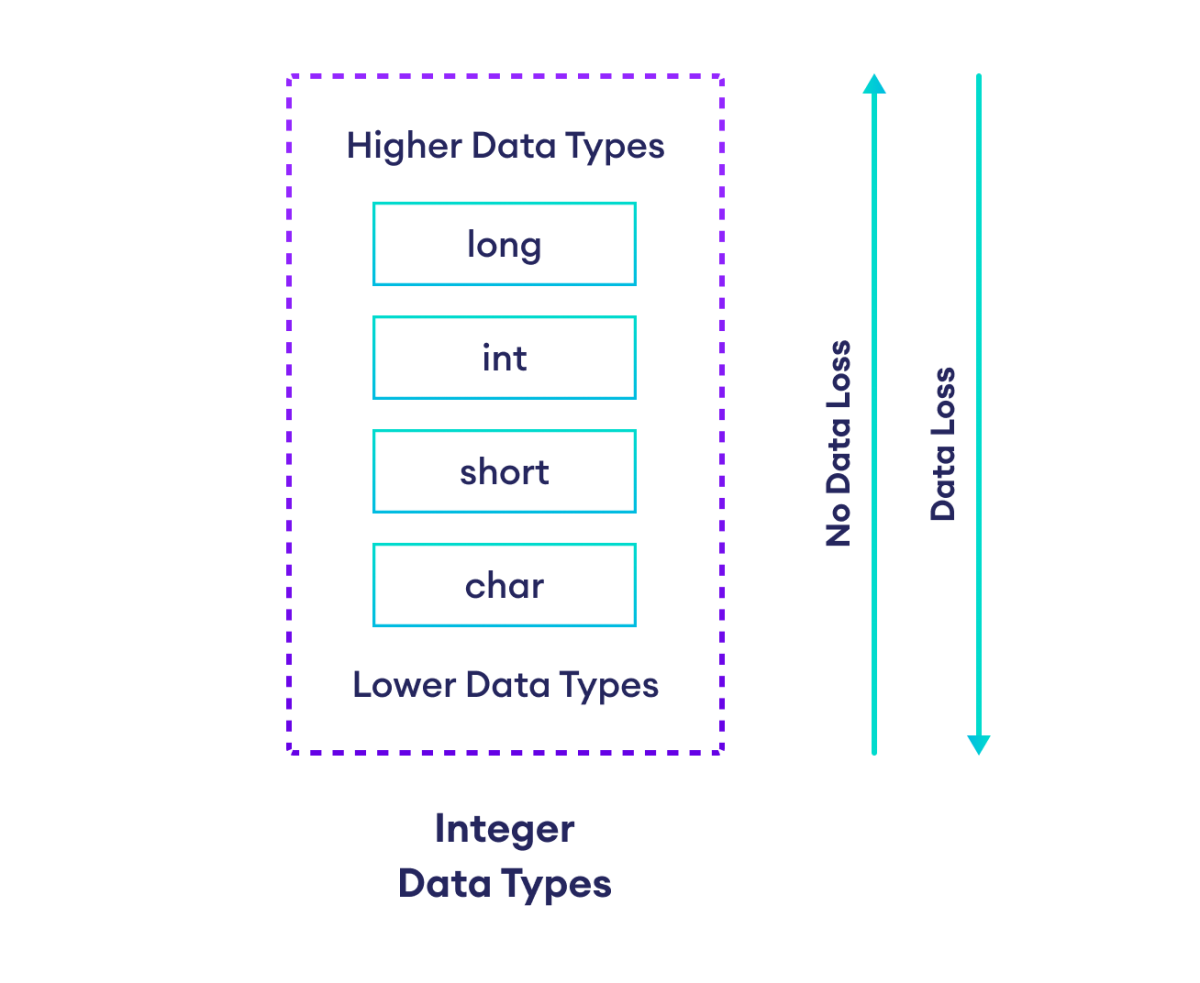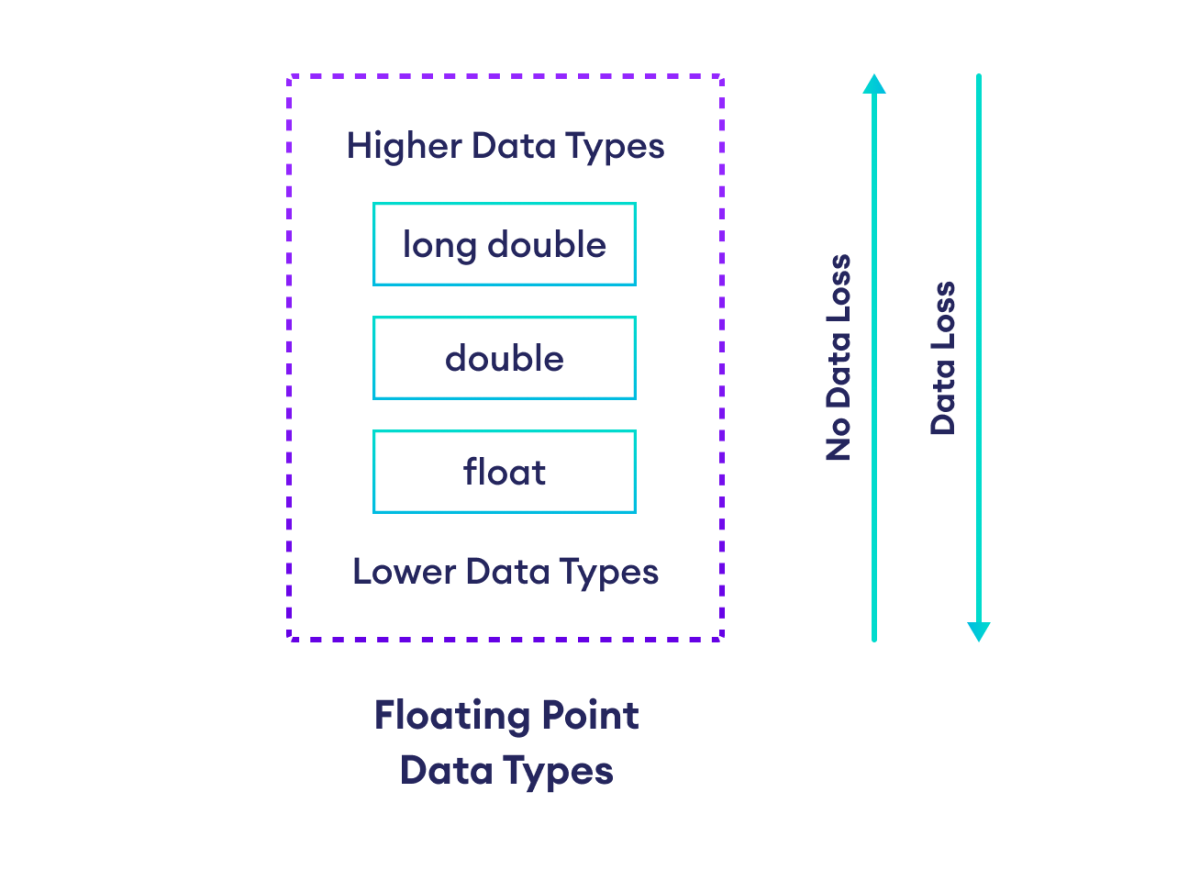C++ allows us to convert data of one type to that of another. This is known as type conversion.
There are two types of type conversion in C++:
- Implicit Conversion
- Explicit Conversion (also known as Type Casting)
Implicit Type Conversion
The type conversion that is automatically done by the compiler is known as implicit type conversion. This type of conversion is also known as automatic conversion.
Example 1: Conversion From int to double
// Working of implicit type-conversion
#include <iostream>
using namespace std;
int main() {
// assigning an int value to num_int
int num_int = 9;
// declaring a double type variable
double num_double;
// implicit conversion
// assigning int value to a double variable
num_double = num_int;
cout << "num_int = " << num_int << endl;
cout << "num_double = " << num_double << endl;
return 0;
}
Output
num_int = 9 num_double = 9
In the program, we have assigned an int data to a double variable.
num_double = num_int;
Here, the int value is automatically converted to double by the compiler before it is assigned to the num_double variable. This is an example of implicit type conversion.
Example 2: Automatic Conversion from double to int
#include <iostream>
using namespace std;
int main() {
int num_int;
double num_double = 9.99;
// implicit conversion
// assigning a double value to an int variable
num_int = num_double;
cout << "num_int = " << num_int << endl;
cout << "num_double = " << num_double << endl;
return 0;
}
Output
num_int = 9 num_double = 9.99
In the program, we have assigned a double data to an int variable.
num_int = num_double;
Here, the double value is automatically converted to int by the compiler before it is assigned to the num_int variable. This is also an example of implicit type conversion.
Note: Since int cannot have a decimal part, the digits after the decimal point are truncated in the above example.
Data Loss During Conversion (Narrowing Conversion)
As we have seen from the above example, conversion from one data type to another is prone to data loss. This happens when data of a larger type is converted to data of a smaller type.
Let's see the data loss during type conversion in integer data types.

Now, let's see the data loss during type conversion in floating point data types.

Note: The data loss may occur during conversion between integer and floating point data types.
C++ Explicit Conversion
When a programmer manually changes data from one type to another, this is known as explicit conversion. This type of conversion is also known as type casting.
There are three major ways in which we can use explicit conversion in C++:
- C++ named casts
- C-style type casting (also known as cast notation)
- Function notation (also known as old C++ style type casting)
Warning: C-style and function-style casting should not be used in modern C++ code.
C++ Named Casts
C++ has four expressions for explicit type conversion. They are known as C++ named casts. They are:
static_castdynamic_castconst_castreinterpret_cast
To learn about each operator, visit C++ Named Casts.
C-style Type Casting
As the name suggests, this type of casting is favored by the C programming language. It is also known as cast notation.
Syntax
(data_type)expression;
For example,
// initializing int variable
int num_int = 26;
// declaring double variable
double num_double;
// converting from int to double
num_double = (double)num_int;
Function-style Casting
We can also use the function-like notation to cast data from one type to another.
Syntax
data_type(expression);
For example,
// initializing int variable
int num_int = 26;
// declaring double variable
double num_double;
// converting from int to double
num_double = double(num_int);
Example 3: Type Casting
#include <iostream>
using namespace std;
int main() {
// initializing a double variable
double num_double = 3.56;
cout << "num_double = " << num_double << endl;
// C-style conversion from double to int
int num_int1 = (int)num_double;
cout << "num_int1 = " << num_int1 << endl;
// function-style conversion from double to int
int num_int2 = int(num_double);
cout << "num_int2 = " << num_int2 << endl;
return 0;
}
Output
num_double = 3.56 num_int1 = 3 num_int2 = 3
We used both the C style type conversion and the function-style casting for type conversion and displayed the results. Since they perform the same task, both give us the same output.
C-style and function-style casting should be avoided in modern C++ code.
These casting methods are considered unsafe because they do not provide the type checking and constraints that C++'s named cast expressions do.
This lack of safety can lead to hard-to-find bugs and undefined behavior in your programs. Instead, it is recommended to use C++ named casts which offer more specific and safer options for type conversion.
Also Read: